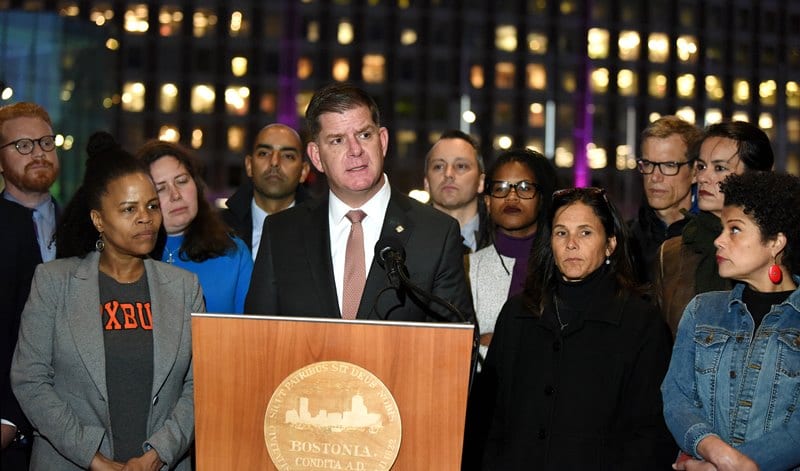
Sunday at 3 p.m., Mayor Martin Walsh held a press conference announcing restrictions on public gatherings and restricting bars and restaurants to operate at 50 percent capacity. But at 6 p.m., Gov. Charlie Baker issued an even more dire set of restrictions, ordering all restaurants and bars closed and banning public gatherings of more than 25 people.
Monday, Walsh declared a public health emergency in the city, after already announcing that Boston Public Schools would be closed from Tuesday through April 27. Schools remained open on Monday, mainly for students who needed to retrieve medications, musical instruments or necessary items from their lockers. As of Tuesday, free breakfast and lunch and homework packets were being offered to BPS students at school buildings and community centers across the city. Chromebook laptops are to be made available to any student who needs one, and families who have not yet received one will be notified shortly by email how to pick up a Chromebook.
As new information about the spread of the novel coronavirus in the United States and around the world sinks in, policymakers at the federal, state and local levels have responded unevenly and sometimes contradictorily. After several days of insisting schools would remain open, Walsh on Friday announced they would be closed Tuesday, following a handful of other Massachusetts districts. Baker also announced Sunday evening that all schools in Massachusetts would be closed until April 6, this after every last school district had arrived by themselves at the decision to close down.
On Monday, the MBTA announced it would reduce service to a weekend schedule. By then, ridership had already declined sharply. Also Monday, Walsh issued an order, backed by labor leaders, closing down construction sites in Boston. Many grocery and other retail stores remain open. Some restaurants remain open for takeout and delivery options only.
The rapidly-evolving bans and restrictions reflect a growing realization among policymakers of the extreme gravity of the coronavirus global pandemic. By Monday afternoon, there were 197 confirmed cases in Massachusetts of COVID-19, the disease caused by the virus — more than half of those stemming from a conference held in Boston by the firm Biogen the last week in February.
The differing policy prescriptions underscored an apparent lack of communication between the Walsh and Baker administrations, both of which appear scrambling to respond to the pandemic and its implications for business, education and civic life in Boston and across the state.
The response of city, state and national leaders can go a long way toward determining whether the number of cases rises quickly and overwhelms the health care system, as happened in Italy, and leads to more deaths from lack of medical care, or whether cases rise more slowly, allowing hospitals to marshal their resources more effectively.
As Walsh underscored in his Monday address, the cooperation of city residents can also potentially slow the spread of the coronavirus. The term “social distancing,” which describes behaviors such as avoiding touching or standing in close proximity to other people, has gained traction with public health officials and political leaders.
“The bottom line is, social distancing works,” Walsh said in a video address Sunday. “It is backed by science and data. What we do in our city over the next two weeks will have a big impact. It will save lives.”
In another dramatic turn, the Trump administration pivoted from the president’s cavalier dismissal of the virus early last week to recommendations Monday that Americans avoid gatherings of more than 10 people, work from home, refrain from eating in restaurants and avoid unnecessary shopping trips. That response stood in stark contrast to Trump’s Sunday claim that the administration had “tremendous control” of the outbreak. When the World Health Organization in January made available the first test for COVID-19 infection, the Trump administration inexplicably declined the test, insisting that the U.S. Centers for Disease Control and Prevention develop its own test, leading to a lengthy process that contributed to a continuing shortage of test kits in the U.S.
The U.S. has tested 38,000 people for the virus in total since January. In contrast, South Korea, which has less than one-sixth the U.S. population, has been testing nearly 20,000 people a day.
Locally, the lack of testing has added to the uncertainty about the extent of the spread of the disease in Massachusetts. The 197 COVID-19 cases recorded as of Monday were among 1,300 people who had been tested for the illness.
To help readers better understand the coronavirus public health crisis, the Banner will provide periodic updates and information on what resources are availa


![Banner [Virtual] Art Gallery](https://baystatebanner.com/wp-content/uploads/2024/04/Cagen-Luse_Men-at-store-e1713991226112-150x150.jpg)



